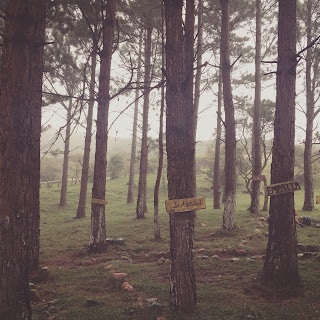I had to go see a
dermatologist back in September for a skin exam (everything was fine) and I
ended up leaving with two unexpected prescriptions: one for foot fungus (ha)
and another for a dry scalp. I’ve never had a problem with dandruff in the US,
but I sometimes do here. I asked the doctor if it’s caused by the humidity, or
the water quality, or the fact that I went from washing my hair every couple of
days to once a week at most. “None of that,” she said, smiling a little, “It’s
just stress.”
Stress?
In many ways, my life is the
definition of chill. I get at least eight hours of sleep most every night. I
wake up to the clouds rolling through the Salto Dupí valley, the calm blue
ocean in the distance, and flocks of green parakeets flying over my house.
Besides mandatory PC events every month and a half or so, I have complete
control of how I spend my time, and most of it is spent doing whatever my gente are doing
- planting, harvesting, chapearing, visiting house to house and
drinking coffee. Living without electricity, WiFi, a washing machine, and
exhaust fumes is actually quite refreshing. I have a solid support network of
neighbors, fellow volunteers, Peace Corps staff, and family and friends in the
states, and there are people in my community who I trust completely. And my
mission of exchanging culture and helping my people improve their health is one
I believe in wholeheartedly (the actual carrying out of this mission is where
it gets messy – see below). So with this tranquilo lifestyle,
where does the stress come in? Ever since that appointment I’ve been thinking
about this a lot.
It’s Saturday afternoon. I’ve
just gotten home from church, and Pricila comes over and asks if I can give her
oil. For what? I ask. To fry bananas, she answers. Normally I’d fill an old
plastic cup with some oil, give it to her, and send her on her way. But I only
have a little oil left, I forgot to buy more when I was in town. I’m sorry
Pricila, I only have a little bit left, I tell her, showing her the bottle. She
stares at me, still expectant. I ask the standard questions. Are your parents
home? No. Is there money to buy oil from the neighbor's store? No. It's not
like the family has no money, but with my host parents not home there is likely
not a single cent in the house to buy oil. But Pricila, I tell her, this is not
really enough oil to fry bananas, and if I give you this oil I will have none
left for myself. I offer to lend them a dollar & change to buy oil from
the tienda. But will we have to pay it back? she asks. By this time
I've been hemming and hawing for over 5 minutes, and my sister-in-law Debora is
probably wondering where in the world the oil is. You may be reading this and
thinking just give her the dang oil Sierra, you can buy more!! But I
worry that my host family, while I love them dearly, sees me as an unlimited
dispenser - of matches, headache medicine, various foods, buckets of water from
my rainwater tank. As a PCV I want to be generous, but not give handouts
because that is the opposite of my job as a sustainable development
worker. Pricila is still waiting, and maybe because I'm trying to fry less food
anyways, or maybe because fried green bananas are yummy and the alternative
lunch of boiled bananas is far less than satisfying, I finally give her the
whole bottle of remaining oil in a huff. I still feel bad for taking out
my frustration on my nine-year-old sister.
This is a problem that
constantly stresses me out. How can one inspire sustainable bottom-up change in
a people & place that has been forced into dependency on outsiders by
centuries of mistreatment and displacement? This is a question that I will
probably be wrestling with long after I finish my Peace Corps
service! Many mornings I wake up wondering if I am making any impact at all,
and on worse days I even wonder if I'm doing more harm than good.
I feel incredibly at home
in my community with my gente. I love living here, but I definitely thought
that I would have it all figured out by now. Three whole months to do a needs
assessment?! I had thought during training. I think I can figure out what the
community needs a lot quicker than that. But after over 13 months, I'm still
trying to figure out what my gente need the most, what is feasible,
and what is realistic. Recently there has been interest in starting a latrine
project. I'm not as naïve as I was a year ago, thinking that this could be a
straightforward endeavor. You have to dig through layers upon layers of family
conflicts, land battles, religious and cultural barriers, subtle gestures and
cryptic words, all in a mixture of my second and third language when talking
with the gente trying to figure out how to go about this project. I've
secured a grant to help one sector of the community improve their water system,
but I still have many doubts and am not 100% sure this is the best route to
take. I'm learning to accept that I will never know for sure if what projects
and community members I'm choosing to focus on is the "best" way to
go. And that's okay.
So yeah, being a
volunteer is confusing and frustrating, but it's also so rewarding and I
am excited for my 10-something months I still have to live this weird and
beautiful life of a PCV.




























